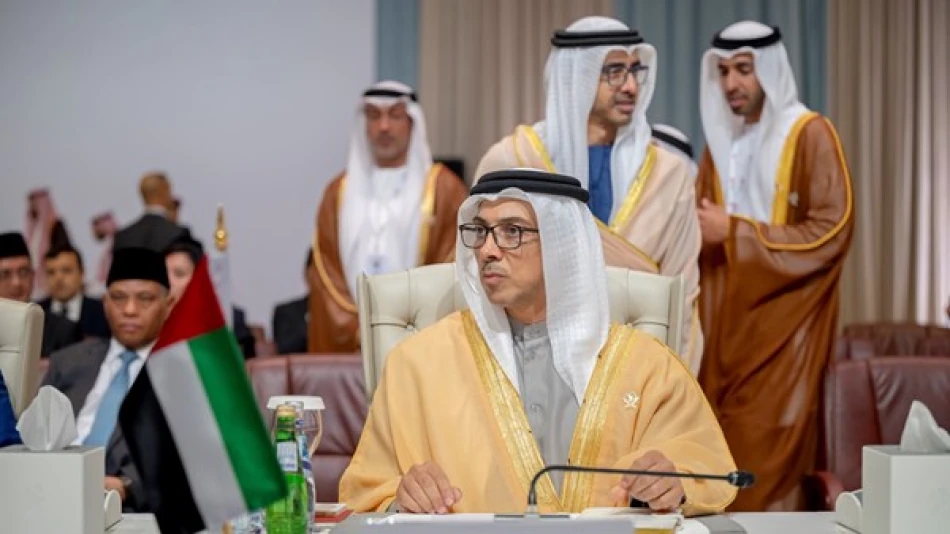
Zayed's Son Represents UAE President at Gulf, Arab-Islamic Summits in Doha
UAE Condemns Israeli Attack on Qatar as Gulf States Rally Against Regional Escalation
The United Arab Emirates has thrown its full diplomatic weight behind Qatar following an Israeli strike on Qatari territory, marking a significant moment of Gulf unity amid escalating regional tensions. At an emergency Arab-Islamic summit in Doha, the UAE condemned what it called Israel's "treacherous aggression" and warned that continued attacks could destabilize the entire region, signaling a hardening stance from a nation that normalized relations with Israel just four years ago.
High-Level Diplomatic Response
Sheikh Mansour bin Zayed Al Nahyan, UAE's Deputy President and Deputy Prime Minister, led the Emirates' delegation to the extraordinary Gulf Cooperation Council session and emergency Arab-Islamic summit on Monday. The gathering, hosted by Qatar's Emir Sheikh Tamim bin Hamad Al Thani, brought together Gulf, Arab, and Islamic leaders to address the September 9 Israeli bombardment of Doha.
The UAE's delegation included Foreign Minister Sheikh Abdullah bin Zayed Al Nahyan and several ministers of state, underscoring the gravity Abu Dhabi places on the incident. This level of representation suggests the UAE views the attack not merely as a bilateral Qatar-Israel issue, but as a threat to broader Gulf security architecture.
Strategic Implications for Gulf Security
Breaking the Normalization Consensus
The UAE's forceful condemnation represents a notable shift from its typically measured diplomatic language, particularly regarding Israel. Since signing the Abraham Accords in 2020, the Emirates has maintained a careful balance between its growing ties with Israel and its Arab identity. This incident appears to have pushed that balance toward regional solidarity.
The attack killed one member of Qatar's Internal Security Force, making it the first Israeli strike to cause casualties on GCC soil. For the UAE, which has invested heavily in regional stability as a cornerstone of its economic model, such escalation threatens the predictable security environment that underpins its status as a global business hub.
Economic Stakes in Regional Stability
The Emirates' strong response reflects deeper economic calculations. As home to major financial centers in Dubai and Abu Dhabi, the UAE depends on regional stability to maintain investor confidence. Any expansion of the conflict beyond traditional theaters could disrupt shipping lanes, energy flows, and the business environment that has made the UAE a preferred base for multinational corporations.
The timing is particularly sensitive as Gulf states navigate a complex energy transition while maintaining their positions as global logistics hubs. Escalating regional tensions could force difficult choices between economic partnerships and regional solidarity.
International Law and Deterrence Strategy
The UAE's statement emphasized international law and UN Charter violations, calling for the UN Security Council to fulfill its "legal and moral responsibilities" to deter Israel. This legalistic approach mirrors strategies used by other middle powers seeking to constrain larger military actors through multilateral frameworks.
By framing the issue in terms of sovereignty and international law rather than purely sectarian or ideological terms, the UAE positions itself as defending universal principles. This approach could resonate more broadly with international partners who might otherwise view the conflict through a regional lens.
Broader Regional Realignment
Gulf Unity Versus Normalization
The Emirates' declaration that "Gulf Arab states' security is indivisible" signals a potential recalibration of priorities. While normalization with Israel brought economic and technological benefits, the UAE appears unwilling to sacrifice Gulf solidarity for those gains when core security interests are at stake.
This stance could influence other regional actors' calculations. Saudi Arabia, which has been considering its own normalization with Israel, may view the Qatar incident as validation of its more cautious approach. The kingdom has consistently linked normalization to progress on Palestinian statehood.
Testing Abraham Accords Durability
The incident presents the first major test of whether the Abraham Accords can withstand regional military escalation. Unlike previous conflicts focused on Gaza or Lebanon, this attack directly targeted a GCC member state, forcing signatories to choose between bilateral relationships and regional solidarity.
The UAE's response suggests that while economic and technological cooperation with Israel may continue, diplomatic cover for military operations will not extend to attacks on Arab states. This distinction could define the practical limits of normalization going forward.
Looking Ahead: Implications for Regional Order
The UAE's response reflects a broader recalibration in Middle Eastern geopolitics, where traditional alliance structures are being tested by new realities. As smaller states face pressure from larger military powers, collective defense mechanisms become more attractive than bilateral arrangements.
For international investors and policymakers, the incident demonstrates how quickly regional dynamics can shift. The UAE's willingness to risk diplomatic complications with Israel over Gulf solidarity suggests that regional identity remains a powerful force, even as economic interests drive new partnerships.
The coming weeks will test whether this unified Gulf response can translate into meaningful deterrence, or whether it represents merely symbolic solidarity in the face of a larger strategic realignment that individual states feel powerless to influence.
Most Viewed News

 Layla Al Mansoori
Layla Al Mansoori






